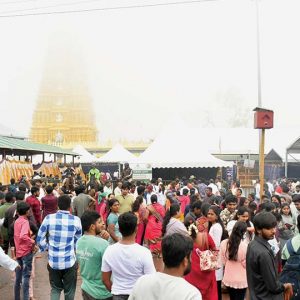By T.J.S. George
A remarkable anthology has come out. It is misleadingly titled as “Two hundred years of English prose.” The main title of the book is just as erroneous: “The Book of Indian Essays.”
This book is more than just “English prose” and “Indian essays.” It is an assertive history of India, outlined by some of the best thinkers of our time — from Aubrey Menen and G.V. Desani to Santha Rama Rau and Nissim Ezekiel. A statement in the blurb puts it in perspective: “A literary anthology also works as an alternative history. This volume resembles a map of middle class India’s social life and aesthetic sensibilities from hybrid perspectives… The essays amuse, surprise, edify.”
How can it not? Basic human nature urges people to listen to what they should not. A western source quoted approvingly by editor Arvind Krishna Mehrotra says: “Stare; pry; listen; eavesdrop. Die knowing something.” It is more likely that you will live a lively life “knowing something.”
The thinkers included in this anthology are among this century’s most irrepressible provocateurs. Consider for example Aubrey Menen, whose second name Menen is not far removed from Menon. (Salvator Aubrey Clarence Menen was born in London and died in Trivandrum in 1989.) The Ramayana as told by Aubrey Menen was published in 1954 and remains banned in India to this day. The ban is because the unorthodox depictions of Dasaratha, of Sita-Ravana relations and of Lakshmana are considered unacceptable to the average Indian. C. Rajagopalachari described the book as “nonsense, but of the unreadable kind, that is, pure nonsense.”
If ultra-conventional ideas find their space, so do unorthodox ones. Bankim Chandra Chattopadhyay examines how “English Civilisation has pulled down the 330 million deities of Hinduism, and set up its own tutelary deities, Comfort and his brother Respectability.” Some precious points are made by Rabindranath Tagore. Such as: “We find men more and more convinced of the superior claims of Christianity, merely because Christian nations are in possession of the greater part of the world.”
That has been a point of discussion in India ever since colonisation began. The “India Gazette” of February 1830 showed how the Pope, sitting in Vatican in Rome, was a virtual ruler of the world. He was in a position to order that, should the natives of newly discovered colonies were ready to embrace Christianity, all would be well. “Otherwise new settlers were authorised to extinguish a whole race totally barbarous and unchristian.” Imagine The Pope with the power to kill a whole race in its entirety.
Other “essays” in the collection may not be as provocative but that does not stop them from being stimulating. There is Salim Ali explaining how “the Crow is a born opportunist.” There is the inimitable G. V. Desani describing how “I learned in Varanasi to be buried underground for half an hour. It is a trick. The non-breathing condition is achieved by concentrating upon a fixed image. I concentrated on the image of a former girl friend. The guru, in the next pit, was concentrating on ‘God’, he said.”
Desani, famous for All About H. Hatterr and Hali, is described as “a British Indian novelist, poet and social commentator, born in Kenya, reared in India and came of age in Britain.” And also as one who “had only basic schooling, no college and never married.”
In the 1950s he moved to Bombay, perhaps with plans to make something of his Indian identity. Nothing came of that. Those were my Bombay days and we became close friends. I remember arranging a luncheon meeting for him with a bunch of Bombay celebrities. Govind Desani didn’t click in Bombay. He merely got accepted as an erratic genius. He celebrated Varanasi by saying things like: “There are experts living in this city who can guarantee to murder anyone unseen, and within the stipulated period, for so much down payment and the balance on conclusion.”
Aubrey Menen is delightful when he describes how his grandmother in Kerala received people formally, “that is to say, with her breasts completely bare. In her view, a wife who dressed herself above her waist could only be aiming at adultery.”
Menen put it bluntly when he said: “The simple idea that first led monks to turn their backs on civilisation was Heaven. Heaven was a place much better than Rome.”
Mehrotra has included quite a galaxy of irresistibles in his anthology. Mukul Kesavan on The Ugliness of the Indian Male, Dom Moraes on God, M. Krishnan on the Jallikattu, Francis Newton Souza on Nirvana of a Maggot. In all, 440 pages of pure delight. Will Mehrotra come out with another volume?
Material, quite rich, is waiting.








Recent Comments